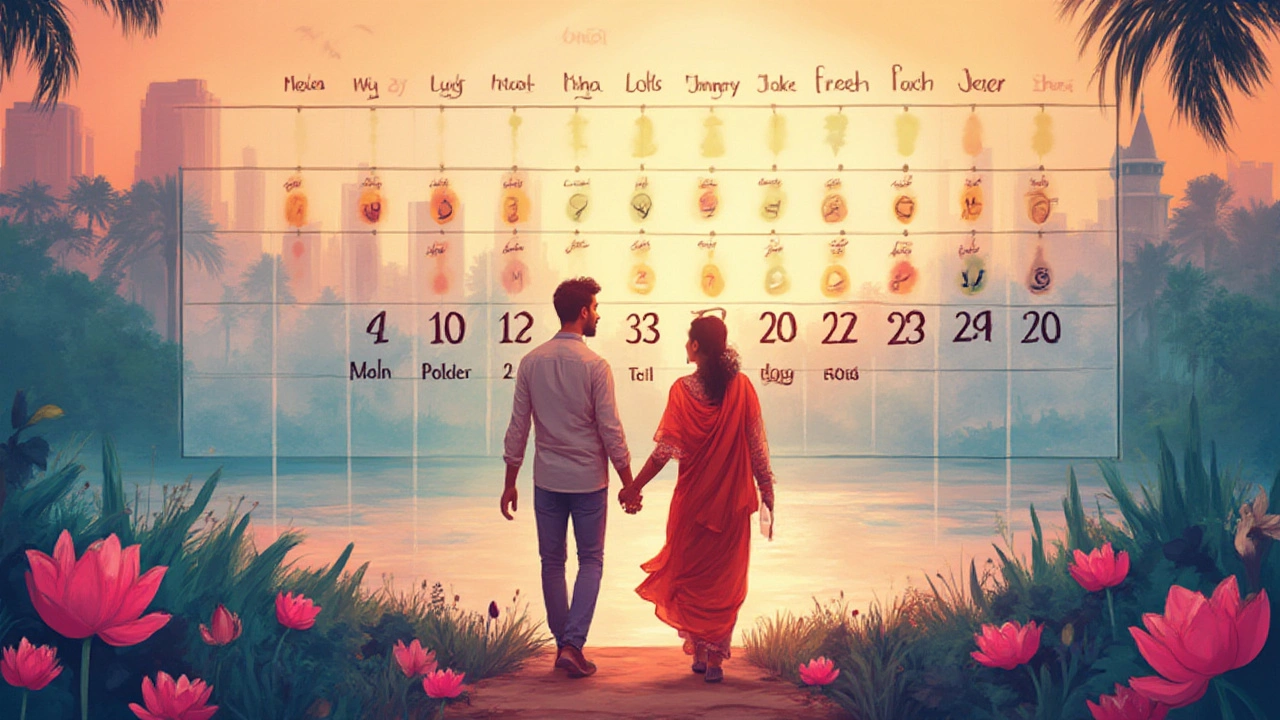If every couple followed a single golden rule, would more of us make it in the long run? The 7 7 7 rule in relationships might just be that tip you didn’t know you needed, a formula that’s sparked conversations from Wellington’s cozy cafes to relationship therapist offices worldwide. It’s no big secret, but it is a viral way of pressing pause and reconnecting just when relationships need it most. The best part? It’s not rocket science, but the pay-off can feel close to magic.
What Exactly Is the 7 7 7 Rule in Relationships?
The 7 7 7 rule isn’t about lucky numbers or winning big at a casino. Instead, it’s a schedule that helps couples build regular quality time into their lives, no matter how chaotic things get. Here’s how it works: for every seven days, couples make time for a date night; every seven weeks, they plan a day trip or adventure together; and every seven months, they try for a longer getaway. It’s that simple, but pretty clever in how it breaks the pattern of just getting by and turns it into shared moments and real connection.
This rule first started doing the rounds on social media, especially TikTok and Instagram, around early 2023. It quickly became a buzz phrase among both new couples figuring things out and longtime partners looking for a reset. The attraction is obvious—the routine helps counter the drift that so often sneaks up on people. According to a 2023 Relationship Wellbeing Survey in Australasia, couples who scheduled regular time together reported 36% more satisfaction than those who didn’t. If you look at it objectively, a predictable structure may remove a lot of the guesswork.
Don’t get it twisted, though—the 7 7 7 rule isn’t about being rigid or following a romantic schedule with military precision. It gives you a structure but lets you fill those slots however you want. One couple might have a fancy dinner every Friday, while another might just order takeaway and catch up over silly YouTube clips. The real win is that you’ve agreed to put date nights (and bigger adventures) on the calendar on a regular basis.
Think of it as a friendly nudge: if it’s been a week, make some plans, don’t just let it slide. If another seven weeks slip by, that’s an extra reminder to break the routine and do something memorable. And as seven months roll around, it’s your permission slip to escape the usual grind and maybe rediscover what first sparked your connection. If you’re someone who finds themselves always ‘too busy’ for time together, this rule can break the cycle.
Why Do Couples Struggle With Consistency?
It’s wild how quickly consistent connection can drop down the priority list when life cranks up the pressure. Suddenly months have passed, and that “let’s go on a date soon” chat hasn’t turned into anything real. Obligations sneak in—work, kids, study, or even just plain tiredness. If you’re like most people I know in Wellington, it’s not unusual for a Wednesday evening to vanish in a haze of house chores and scrolling.
A lot of couples fall into the trap of thinking passion and connection will look after themselves once you've got the basics sorted. The truth is, left to their own devices, most relationships quietly go into autopilot. A 2024 Massey University study of New Zealand couples actually found that routine and predictability in relationships can lead to feelings of emotional distance. But it also showed the couples who made time for new experiences reported the strongest bonds.
This is why the 7 7 7 rule is getting traction: it’s not about finding more time, it’s about re-prioritizing the time that’s already there. You don’t have to quit your job, hire babysitters every Friday, or drain your savings for fancy weekends away. It’s about intention, not grandeur. A lot of people realize too late that quality moments need to be booked in just like anything else worth keeping—friend catch-ups, health check-ups, or those long-overdue nights out you used to have all the time before ‘adulting’ happened.
If you’re thinking that this doesn't sound spontaneous, you’re not alone. A huge myth is that real romance should be totally unplanned. But think about anything you actually value: your physical health, your career, your pets. All of these need some kind of regular attention—why wouldn’t your relationship? When you make together-time a regular part of your schedule, it becomes something to look forward to (not something that just ‘maybe’ happens).
It can feel awkward at first to schedule romance, but it’s less about penciling in kissing at 7:45pm and more about protecting space for each other—no interruptions, just a chance to connect in whatever way suits you both. Sometimes you’ll end up just crashing, other times you might feel that spark again. The point is, you gave yourselves the space for it to happen.

How to Actually Use the 7 7 7 Rule (Without Making It Feel Like a Chore)
If you’re worried that this is just another TikTok trend, here’s the real spin: consistency doesn’t mean boring, and scheduling doesn’t kill romance. The trick is to make it easy on yourselves, not something to stress over. Here’s how people are making it work (and how you can too):
- Keep it flexible. If you miss a week, don’t stress. Move your plans, don’t cancel them. Life happens, just don’t let “not this week” turn into “maybe next month.”
- Mix up your date nights. It doesn’t have to be dinner and a movie every time. Try a sunset stroll on the beach, hit a local comedy night, cook something together, or play old-school board games.
- For the seven-week mini-adventure, get out of your comfort zone. Go to a part of your town you never visit, try a new food truck, or check out a weird museum exhibit. That little burst of novelty works wonders for keeping things interesting.
- Seven-month getaways don’t have to mean Bali or something massive (unless you want to). Even a chilled Airbnb in your own city can do the trick. The important bit is changing your normal backdrop and having that downtime together.
- Use the rule to spark convos about what you both enjoy. Sometimes we assume we know what our partner likes, but people’s preferences change. Make it part of the fun to ask each other, ‘What would feel good for you this time?’
- Share the planning. Don’t put the mental load on one person every time. Alternate who books the table, who comes up with the adventure, who finds the Airbnb.
- If things are tight, go budget-friendly. There’s nothing wrong with a picnic in the park, a free gig, or even just making fancy toasties together and watching something you both love.
Lots of couples are using tech to help—set a shared calendar, pop in a reminder, use that ‘countdown’ function everyone forgets about. If you’re both onboard, it won’t feel like nagging. You know that feeling when you’ve locked in a little trip, and it makes the tougher weeks easier to handle? That’s what the seven-month part of this rule aims for. It gives you light at the end of the tunnel, something exciting on the distant horizon besides bills and meetings.
If kids are in the picture, this can actually work better. The ‘every seven weeks’ adventure can double as family outings, while date nights can be as simple as putting the kids to bed early and watching bad TV together. The 7 7 7 rule isn’t one-size-fits-all, but it stops you from waking up one day and realizing you haven’t hung out properly in ages.
Here’s a wild stat: couples who tried variations of this rule (sometimes with different numbers) reported less resentment and more regular intimacy by the end of a year than before they started, according to a 2023 UK survey of 400 long-term partners. It’s those small, regular check-ins that become the glue, even if you don’t notice the difference right away.
The Science Behind Scheduled Connection
Brains love patterns, but they also need novelty. Relationship experts often talk about the ‘Goldilocks zone’ between routine and excitement. Too much sameness and things go stale; too much chaos and you burn out. The 7 7 7 rule finds a healthy middle. When you commit to shared experiences on a reliable rhythm, your relationship gets a boost from the chemistry your brain produces during shared activities and anticipation—the dopamine hit you get while looking forward to a special night isn’t just hype, it’s science.
Take the research from Dr. John Gottman, one of the most respected relationship psychologists in the world. He’s shown in decades of studies that regular, intentional couple time is strongly linked to resilience in tough times. It acts as a pressure valve for friction and creates more chances for meaningful conversation—the kind that doesn’t happen between quick dinners and bedtime routines.
On the flip side, couples who let months go by with minimal real contact start to function more like housemates sharing chores and bills than actual partners. That erosion is usually so gradual nobody notices until something big goes wrong. Setting up rituals, even as simple as a weekly coffee run or a seven-week hike, signals to both partners: ‘Hey, we matter. Us-time matters.’
According to a 2024 Australian study, couples who use planned date nights report 25-37% improved satisfaction with their relationship, regardless of how long they’ve been together. The benefit wasn’t just more enjoyable time—it was less arguing about feeling ‘neglected’ or ‘unappreciated’. When both people know there’s a plan, expectations align. No more wondering, ‘Do they care?’ or ‘Why aren’t we doing things together anymore?’
Routine also gives your brain something to anchor onto. You know how holidays feel better when you look forward to them? Same applies here. Even the smallest plan, once locked in, can help you cope in stressful times. It’s why sports teams train routinely, or why we set up birthday catch-ups for our mates—a pattern makes everything less likely to slip through the cracks.
Interestingly, you can’t cheat this with money. Couples who spent heaps on big nights out but skipped smaller, regular moments didn’t report much better results in happiness studies. It’s the regularity, not the extravagance, that makes the biggest difference. It turns out, being there—showing up with your attention reliably—outweighs almost any grand gesture.

Making the 7 7 7 Rule Stick in Real Life
Anyone can start something, but how do you keep it going? The biggest challenge comes down to inertia and resistance from partners who aren’t big on planning. Maybe you or your partner are sceptics, rolling your eyes at the idea of a rule for romance. Here’s how people actually manage to keep to it beyond the first burst of enthusiasm:
- Start small. You don’t need to overpromise with perfect date nights every single week. Just pick a recurring free night and protect it from outside plans.
- Celebrate wins. Did you sneak in an adventure even when it rained all week? High five each other. Acknowledge when you pull it off and how it felt.
- Talk about barriers, not just the fun stuff. Is work stress making it impossible? Too tired from parenting? Hash it out—the solution is almost always tweaking the plan, not scrapping it.
- Don’t weaponize the rule. If your partner messes up or forgets, show some grace. The point is connection, not ticking off boxes.
- Get friends or family on board to help if kids or logistics are tricky. Set up swaps or group adventures so things don’t stall just because child-free time is hard to lock in.
- Document your adventures. Share photos, keep a notes app with ideas for future date nights, and look back at what you’ve done together. Memory is a powerful tool against drifting apart.
The biggest obstacle is always the same: letting the rule become ‘just another thing’ on the endless to-do list. But couples who checked in every couple of months—“Do you still like how our date nights are working? Want to switch anything up?”—found they actually looked forward to tweaking the plan.
It’s not about perfection. Even the most committed couples sometimes miss a date night or have to reschedule a trip. What matters is that you hold a shared commitment to reconnect. It becomes a shared language: ‘We matter enough to try.’ That sense of teamwork is what relationships are really about.
So, the next time you find yourself lying on the couch, wondering when you last had proper fun together, remember the 7 7 7 rule. It’s the simplest, most human way to stop love from quietly becoming a memory. Just make the time—you probably won’t regret it.
